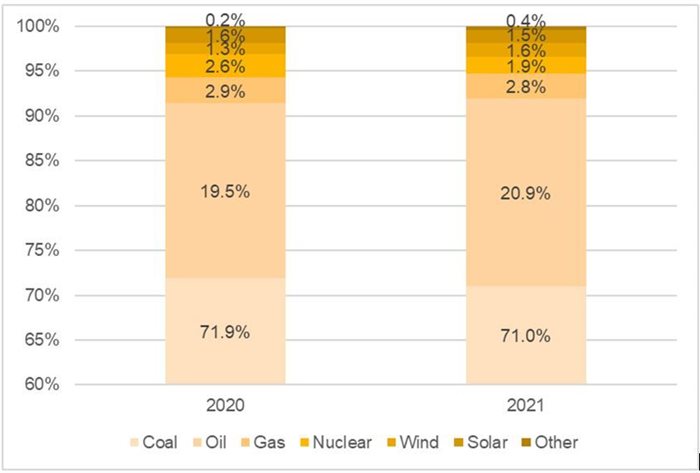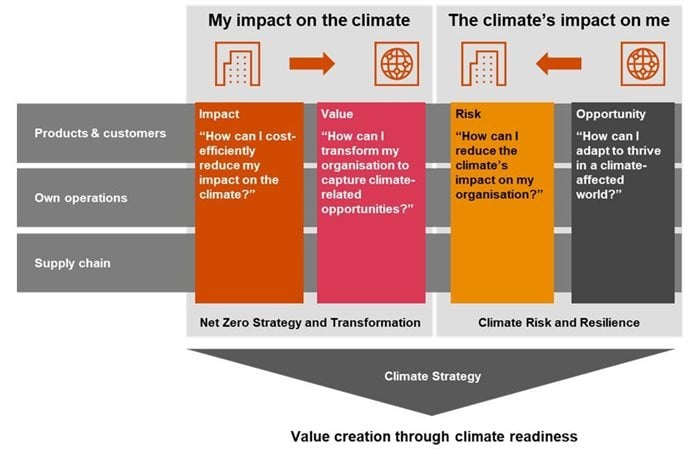The world achieved a reduction in carbon intensity (measured as tonnes of CO2/real GDP) of 0.5% in 2021. New insights from PwC South Africa's recently published Net Zero Economy Index 2022: South African viewpoint show that South Africa reduced its carbon intensity by a significant 4.6% during the year.
This included a decline in coal (-0.8%) and gas (-3.0%) usage while energy from wind (+16.7%) and hydroelectricity (+100.9%) increased significantly. Coal accounted for 71.0% of the local fuel mix in 2021, down from 71.9% in the previous year.

Figure 1: National fuel consumption by type (% of total). Source: PwC calculations based on data from bp
The recent decrease in coal usage was not, however, due to the country actively trying to use less of this resource, but rather largely as a result of record-high electricity load-shedding during 2021, caused by significant breakdowns at coal-fired power stations. As a result of its relative inaction in decarbonisation, South Africa is still the most carbon-intensive economy within the Group of 20 (G20) due to its reliance on coal for electricity generation.
However, this needs to be seen within a global context of disappointing decarbonisation results. PwC wanted the agenda at the recent COP27 to concentrate on taking action and meeting climate commitments as previous commitments have not been matched by enough action. As climate action slowed down amongst the G20 countries, the global rate of decarbonisation in 2021 was at its lowest level in over a decade.
South Africa starting JET IP implementation plans in February 2023
Looking ahead, the year 2023 is anticipated to be a period of greater climate action in South Africa. The government recently launched its Just Energy Transition Investment Plan (JET IP) for an initial period of five years (2023-2027) at COP27. The country developed this investment plan to clarify its priority investment requirements starting in 2023 in the electricity, new energy vehicles (NEVs), and green hydrogen sectors, to support goals of energy security, a just transition, and economic growth.

Lullu Krugel, partner at PwC’s Strategy&
In the immediate future, arrangements for JET IP implementation will start in February 2023. The implementation plan will be a product of efforts across government, civil society, trade unions and the private sector. The plan will include relevant timelines and will rely on existing South African institutions and systems — augmented by adopting both local and international best practice across various disciplines.
In the new year, Eskom is also expected to start the decommissioning and repurposing of coal-fired power plants at its Camden and Hendrina power stations. These efforts will see the power utility remove 3,600MW of coal-fired power generation from the grid over a three-year period. These (and other similar operations) will be refitted with renewable energy generation and energy storage capacity. This endeavour will include reskilling workers to transition from jobs linked to coal to employment opportunities in the clean energy sector.
Businesses needs to build their climate resilience
On a practical level, what does the national decarbonisation drive mean for private companies? From our interactions with government and business leaders at COP27, it is clear that evidence of decarbonisation is a powerful differentiator for businesses in an environment where having a CO2 emissions target is merely a licence to operate. Leading organisations are generating incremental value by reimagining how their capabilities will be deployed in a post-carbon world and appealing to sustainability-aware consumers, investors, staff and other stakeholders via sustainable transformations.
Climate resilience is a powerful source of protection against disruption and value loss. South African companies need to build climate resilience via a deep analysis of value chain exposure to physical and transitional risks — this will in all likelihood be mandated through sustainability reporting standards, although the speed of adoption in South Africa is still unclear. Enterprises should, however, not stop at risk resilience, but also identify and convert business opportunities resulting from mitigation and adaptation activities.

Figure 2: Value creation through climate readiness. Source: PwC
click to enlargeDeep analysis is needed to understand supply chain emissions
Prior to COP27, we detailed four net zero priorities that businesses should pursue in 2023 in an effort to build climate resilience. These are:
1. decarbonisation of operations and the supply chain;
2. understanding climate risk and building resilience;
3. mobilisation of sustainable capital; and
4. robust audit and ESG reporting.
Regarding the first point, supply chain emissions often dwarf the carbon impact of direct operations: for most companies, they make up 65–95% of their carbon impact. We have also typically found that as much as 80% of an organisation’s supply chain emissions come from as few as one-fifth of its purchases.
At the same time, companies cannot go it alone in the efforts to decarbonise supply chains. Cooperation is a key theme for this year across all industries as the opportunities and challenges raised by climate change transcend historical business models. Many companies within the same industry will collectively need to overcome the lack of supplier emissions data through joint data pooling. Data collection and transparency will be key to understanding the nature of emissions.
The collaboration needs to include not only industry players and stakeholders, but also the public sector and affected communities. Decarbonisation is a joint effort and needs commitment and action from all members of society, starting today.






















































